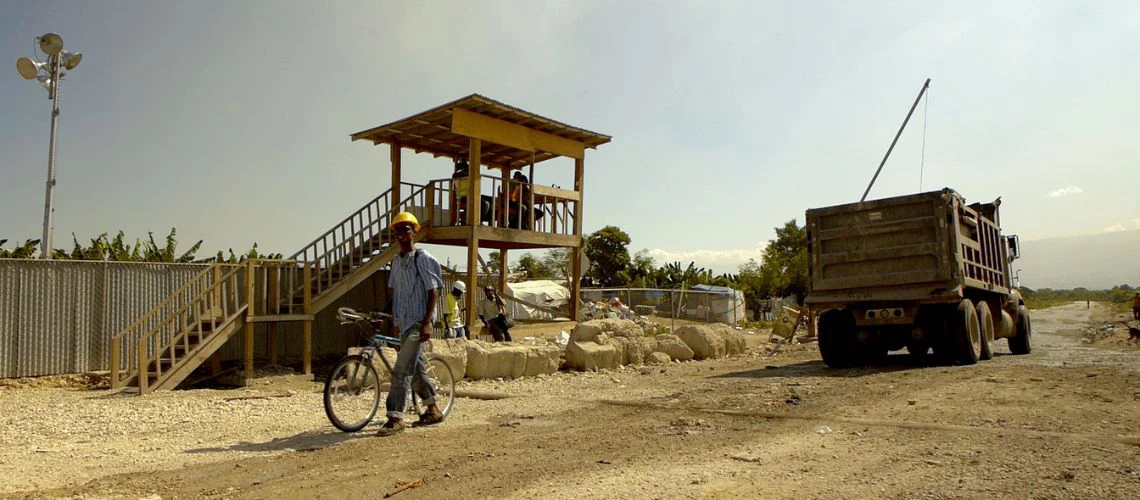 Trucks carrying the rubble from Port au Prince, Haiti into Truitier debris management site pass a checkpoint which controls for content and weight.
Trucks carrying the rubble from Port au Prince, Haiti into Truitier debris management site pass a checkpoint which controls for content and weight.
Countries grappling with fragility, conflict, and violence (FCV) need exceptional support to foster sustainable development and reduce poverty. An IMF strategy paper sheds light on the difficulties FCV countries and regions face: they suffer from high human and economic costs, slow growth, rampant inflation, and widespread poverty. The risk of continuing violence can undermine stability and block progress for decades. These challenges demand decisive action from the international community.
The World Bank's response to FCV has stepped up to the task. With a record $30 billion in financing for FCV-affected countries, the Bank’s strategy tackles the root causes of fragility, builds resilience, preserves (or rebuilds) critical institutions, and creates opportunities for refugees and host communities, often in partnership with humanitarian and development partners. In addition, it has improved its toolkit supporting its FCV strategy to help with assessments, studies, and partnerships that encourage smart, sustainable investments.
Addressing extreme challenges
Infrastructure is essential for putting FCV countries on the path of sustainable development . However, infrastructure is big, expensive, and difficult to build and operate in unstable environments. Why? First, many FCV countries struggle with financial difficulties. They often face challenges in establishing effective tax systems to raise funds and may lack the capacity to create and manage budgets. What funds they have are used for urgent needs like social safety nets and emergency response. Other needs, including long-term infrastructure investments, are put off for another day.
Can the private sector, NGOs, or civic groups save the day? With good coordination, the answer to this question is a resounding yes. However, instability, remoteness, and heightened security risks in FCV areas can take time to address and make it more costly to operate. This leads to the vital question: What can we do to kick-start the infrastructure investments necessary for effective, sustainable development in places affected by FCV?
One way is through the Quality Infrastructure Investment (QII) Partnership, a joint initiative of the government of Japan and the World Bank that provides grant support for incorporating the G20 QII Principles in World Bank infrastructure projects. The QII Principles emphasize sustainability, economic efficiency, environmental and social considerations, resilience, and good governance in infrastructure investments. The Partnership's targeted interventions have a leveraging effect that can amplify the impact of larger World Bank operations. Its flexible approach helps identify and address specific bottlenecks. Tailoring support to the FCV context allows for adaptability, which is crucial where conventional solutions may fall short.
The QII Partnership puts an emphasis on capacity building that leads to sustainable, long-term benefits . What does this mean in practice? In short, investing in people, empowering local communities, and helping governments work better. This focus on building local capabilities is vital in FCV contexts, where resilience and self-sufficiency are essential for recovery and development.
Making a difference
This approach has been successful in countries across the globe. In Cameroon, for instance, government officials learned how to apply life-cycle costs (LCC), where the total costs of an infrastructure project are considered over its entire lifespan—in the design and management of road infrastructure. These skills, which align with QII Principle 2—raising economic efficiency in view of life-cycle cost—can be applied to any infrastructure project in the future.
In Solomon Islands, an analysis funded by the Partnership led to the introduction of prefabricated modular bridges. This initiative, which aligns with QII Principles 3 and 4—integrating environmental considerations and building resilience in infrastructure investments—offers a replicable, cost-effective solution for infrastructure development in FCV contexts.
Haiti offers another example. A QII Partnership-funded study highlighted the positive socioeconomic impact of better road connections on rural women, emphasizing the need for gender-equal project designs and equal access to infrastructure. It also stressed the importance of addressing social norms and behaviors to reduce the gender gap in infrastructure usage.
The successes in Cameroon, Haiti, and Solomon Islands are just the beginning. We can drive positive change by prioritizing quality infrastructure that adheres to the principles of sustainability, efficiency, resilience, and inclusivity. Looking ahead, it’s clear we need to scale up these efforts in FCV countries, share best practices, and refine and enhance our strategies. We must also expand collaboration with like-minded stakeholders, including governments, donors, the private sector, and development institutions. That will be key to mobilizing the resources and expertise necessary to meet the challenges of FCV contexts head-on.
For more information on the QII Partnership and its initiatives, visit the QII Partnership website or follow us on LinkedIn.
Related:
Driving positive change: How quality infrastructure drives development in fragile countries
How Quality Infrastructure Investment is making a difference in development
Modular bridges: A climate-resilient solution for small bridges in the Pacific
Democratic Republic of the Congo (DRC) - Kinshasa’s Path Towards Resilient Urban Development


Join the Conversation